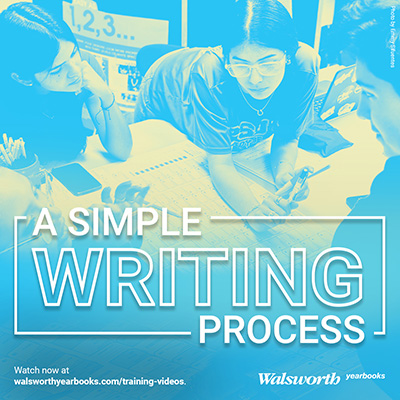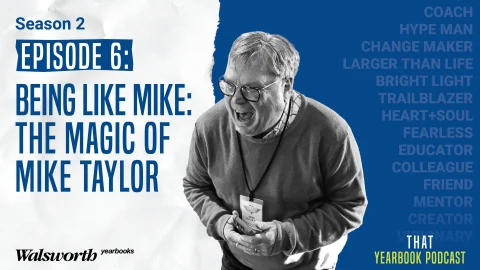As yearbook advisers and student journalists, we have a unique opportunity to capture the essence of a school year and preserve it for generations to come.
In the latest episode of That Yearbook Podcast, seasoned yearbook experts Jim and Sabrina Schmitz, CJE, shared their insights on crafting compelling journalistic stories for the yearbook. Their message was clear: yearbook is journalism, and our stories must be held to the highest standards of accuracy, objectivity and emotional resonance. Alongside this podcast is our companion training video where students will be encouraged to read like writers and look at well-crafted stories that highlight the memorable moments of the year.
Effective Interviewing: The Foundation of Storytelling
The foundation of any great yearbook story begins with the interview process. As Jim and Sabrina emphasized, conducting in-person interviews is crucial rather than relying on text messages, emails or written questionnaires. The reason is simple: Face-to-face interactions allow you to capture the nuances of body language, tone, and emotional expression that can breathe life into your quotes and descriptions.
Jim and Sabrina encouraged participants to be curious, engaged and flexible during the interview process. Rather than sticking to a rigid list of questions, they advised being open to following the natural flow of the conversation and allowing your subjects to share their stories in their own words.
“The quotes are going to be the heart of your story,” Sabrina said. “So you need to get good ones – ones that are full of emotion, personality and vivid details. That means being there, in the moment, and listening to what your subjects are telling you.”
Finding the Angle: Honing in on the Human Story
Once you’ve conducted your interviews, the next step is to identify the unique angle or focus of your story. As Jim and Sabrina emphasized, it’s not enough to simply provide a broad overview or recap of an event or activity. Instead, you need to find a specific, human-centered story that will captivate your readers.
“Don’t write about ‘man’ – write about ‘a man,'” Sabrina said, quoting the famous advice of Mark Twain. “We don’t want to cover the whole pie; we want a specific slice of it. Look for those moments, those individual experiences, that get to the heart of the story you’re trying to tell.”
Finding a human-centered story, regardless of your topic, is going to make your writing stand out. No more “family bonding” stories or game losses and wins. Your goal is to always tell the stories that are compelling and will be timeless when read decades from now.
Crafting Compelling Leads: Hooking Readers from the Start
With your interviews conducted and your angle identified, it’s time to put pen to paper (or fingers to keyboard) and start crafting your story. And as Jim and Sabrina emphasized, the key to a successful yearbook story begins with the lead.
“The lead is what’s going to draw your readers in and make them want to keep reading,” Sabrina explained. “It’s your chance to capture their attention and set the tone for the rest of the story.”
Jim and Sabrina walked participants through a variety of lead styles, from descriptive leads that paint a vivid picture to contrast leads that highlight stark differences. They stressed the importance of being present and observant during the interview process, as descriptive leads in particular require a keen eye for detail and sensory experiences.
“If you’re not there, you can’t write a good descriptive lead,” Sabrina said. “You need to be able to see, hear, smell and feel the environment you’re trying to describe. That’s what’s going to make it come alive for your readers.”
Key Takeaways
Throughout That Yearbook Podcast, Jim and Sabrina consistently emphasized the importance of approaching yearbook writing with the same rigor and attention to detail as professional journalism. From conducting thorough, in-person interviews to crafting compelling leads and accurately representing quotes, every aspect of the storytelling process requires a steadfast commitment to journalistic integrity.
Be sure to tune in to this latest episode and watch the latest training video with your class. This isn’t a topic you’ll want to miss!





